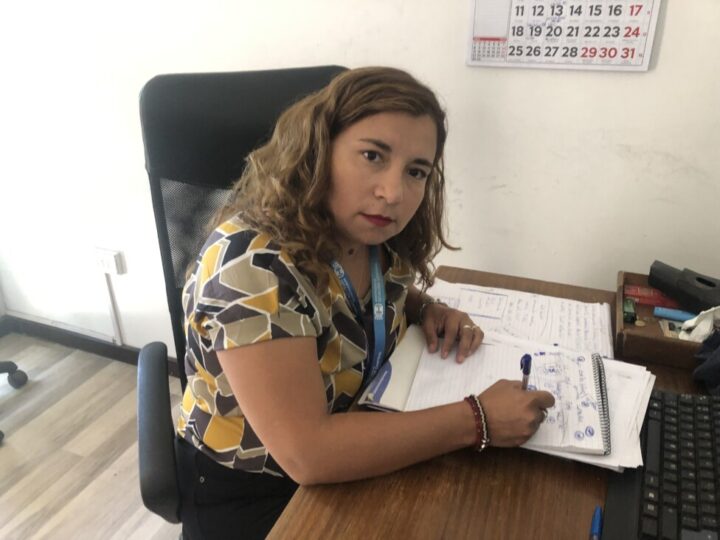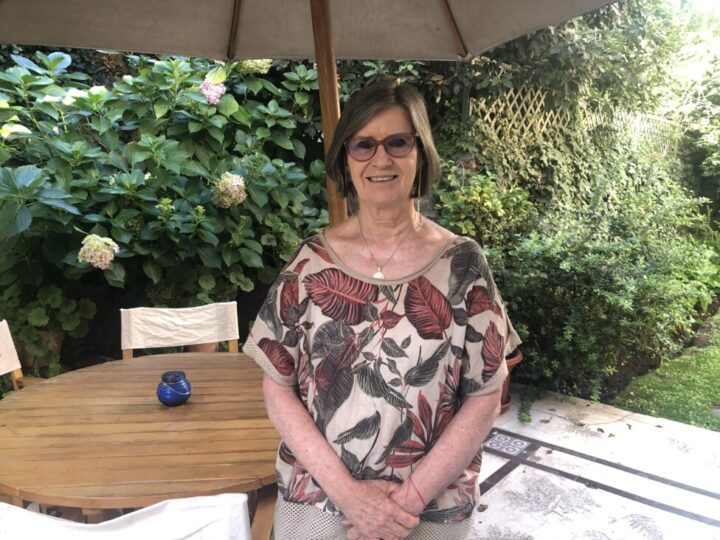by Orlando Milesi (santiago)Wednesday, March 20, 2024Inter Press Service
SANTIAGO, Mar 20 (IPS) – In Chile, as in the remainder of Latin America, the duty of caring for individuals with disabilities, the aged and youngsters falls to ladies who, in consequence, wouldn’t have entry to paid jobs or time for themselves.
Unpaid home and care work is essential to the economies of the area, accounting for round 20 p.c of gross home product (GDP).
Measurements by the Financial Fee for Latin America and the Caribbean (ECLAC) discovered that in 16 Latin American nations, ladies spend between 22.1 and 42.8 hours per week on unpaid home and care work. Males solely spend between 6.7 and 19.8 hours.
Ana Güezmes, director of ECLAC’s Division for Gender Affairs, informed IPS that “in most nations ladies work longer whole hours, however with a decrease proportion of paid hours.”
“This work, which is prime for sustaining life and social well-being, is disproportionately assigned to ladies. This example impacts ladies’s autonomy, financial alternatives, labor and political participation and their entry to leisure actions and relaxation,” Güezmes mentioned at ECLAC headquarters in Santiago.
The scenario is much from altering as it’s replicated in younger ladies who commit as much as 20 p.c of their time to unpaid work.

Girls left on their very own as caregivers
Paloma Olivares, 43, chairs the Yo Cuido Affiliation in Santiago, Chile, which brings collectively 120 members, solely two of them males.
“Girls caregivers are denied the correct to take part on equal phrases in society as a result of we’re pressured to decide on between exercising our rights or doing caregiving work. And we can not select as a result of it’s a job we do for a liked one, for a member of the family,” she informed IPS.
“We’re left able of inequality, of absolute vulnerability as a result of you must commit your life to supporting another person on the expense of your private life,” she mentioned.
Olivares stopped working to look after Pascale, her granddaughter, who was born with cerebral palsy and hydrocephalus.
Three days after her start, a bacterium grew to become lodged in her central nervous system. She was hospitalized for nearly a 12 months and have become severely dependent.
On the time, she was given a seven p.c probability of survival. At present she is eight years outdated, goes to highschool and lives an virtually regular life because of the work of her caregivers.
She is now cared for by her mom Valentina, who had her on the age of 15. Paloma was in a position to return to paid work, however her daughter deserted her research to deal with Pascale.
“While you begin being a caregiver, friendships finish, as a result of nobody can sustain. Even the household drifts away. That is why most caregiving households are single-parent, the girl is left alone to care as a result of the person cannot sustain with the tempo and the emotional and financial burden,” she mentioned.
Olivares participated from Mar. 12 to 14 in a public listening to, digital and in individual, on the correct to care and its interrelation with different rights, in a collective request of a number of social organizations and the governments of Chile and different Latin American nations earlier than the Inter-American Court docket of Human Rights (IACHR Court docket), primarily based in San Jose, Costa Rica,
Within the request for an opinion from the IACHR Court docket, “we requested the Court docket to take a stance on the correct to care and the way the rights of ladies particularly have been violated as a result of there are not any public insurance policies on this regard. We wish the Court docket to pronounce itself on the correct to care and the way the States ought to tackle it in order that this proper is assured and so the rights of caregivers are not violated,” she defined.
It’s anticipated that the Court docket’s pronouncement on the matter will come out in April and will set up minimal parameters concerning ladies caregivers for Chile and different Latin American nations.
Vital scenario for ladies caregivers
Millaray Sáez, 59, informed IPS by phone from the southern Chilean metropolis of Concepción that her son Mario Ignacio, 33, “is not the autonomous individual he was. Since 2012 he has change into a child.”
She chairs the AML Bío Bío Corporación, an affiliation of ladies within the Bío Bío area created in 2017 to deal with the query of feminine empowerment and at the moment devoted to the problem of caregivers.
“I’ve been a caregiver for 30 years for my son who has refractory epilepsy. He grew to become prostrate in 2012 on account of medical negligence,” mentioned the worldwide commerce engineer who has change into an skilled in public insurance policies on care with a gender perspective.
Sáez mentioned “the scenario of ladies caregivers may be very dangerous, very precarious. There’s a single trigger, which is the work of caregiving, however the penalties are multidimensional…. from bodily deterioration to the dearth of laws to guard in opposition to types of violence, and starting from the household to what society or the State provides.”
She additionally pointed to the financial penalties of dependent care.
She cited instances wherein caregivers spend over 150 {dollars} a month on diapers alone for an individual who wants them. And he or she identified that the federal government supplies an financial support stipend of simply 33 {dollars} a month.

The magnitude of the issue
It’s a pending process to find out the variety of ladies caregivers in Chile.
The federal government of leftist President Gabriel Boric created a system for caregivers to register and obtain a credential that offers them entry to public providers.
“The credential is the gateway to the Chile Cuida System. With it we search to make them seen in providers and establishments and to reward them for his or her work by saving them ready time in every day procedures,” the Minister of Girls and Gender Fairness, Antonia Orellana, defined to IPS.
Thus far, there are 85,817 individuals registered, of whom 74,650 are ladies, or 87 p.c of the overall, and 11,167 are males, in keeping with information supplied to IPS on Mar. 14 by the Undersecretariat of Social Companies of the Ministry of Social Improvement and Household.
However Chile has 19.5 million inhabitants, and “17.6 p.c of the grownup inhabitants has some extent of incapacity and, due to this fact, requires the every day care and assist of different individuals within the dwelling,” the minister mentioned.
Which means 3.4 million Chileans rely upon a caregiver.
In response to Orellana, dealing with the care situation projected by the getting old of the inhabitants would require the collaboration of everybody to “create and maintain an financial and productive system that generates respectable work and formal employment, leaving nobody behind.”
Different pressing calls for by ladies
Sociologist Teresa Valdés, head of the Gender and Fairness Observatory, informed IPS that there are numerous social issues dealing with Chilean ladies at the moment, “particularly these associated to entry to well being care, social safety, unequal pay and entry to completely different items and providers.”
Valdés regretted that the time period “ladies caregivers” is used to check with the position that ladies play and the duties which might be culturally assigned to them as a precedence.
“We’re all caregivers, all ladies work double shifts. The time-use survey exhibits that we work an extra 41 hours per week of so-called unpaid reproductive care work,” she mentioned.
In response to Valdés, the principle advance on this drawback is to incorporate it within the debate as a result of these are insurance policies that require a whole lot of sources and in depth improvement, since they need to do with the construction of the labor market.
“A part of the proposal ought to be methods to ‘de-genderize’, how care turns into a process of shared duty and never solely that ladies have extra time to tackle the care duties,” she mentioned.
“After we name ladies caregivers, we’re referring to the group most affected by the circumstances of sexual division of labor and household copy,” she added.
The skilled proposes progressively figuring out methods to assist ladies caregivers with a purpose to present them with accessible time and deal with their psychological well being.
She praised the applications promoted by some municipalities to release time for these ladies to get pleasure from leisure and self-care.
“Now we have to maneuver in direction of a cultural conception that we’re all dependent. At present I rely upon you, tomorrow you rely upon me. Care is a social process wherein I deal with you at the moment to be able to deal with me tomorrow. And that’s one thing that has to begin from the earliest childhood,” she argued.
© Inter Press Service (2024) — All Rights ReservedOriginal supply: Inter Press Service
The place subsequent?
Newest information
Learn the newest information tales:
Unpaid Caregivers, a Image of Inequality in Chile Wednesday, March 20, 2024Managing Transboundary Aquifers for Peace Wednesday, March 20, 2024Biogas Is Key to Concord Between Agribusiness and Surroundings in El Salvador – VIDEO Wednesday, March 20, 2024In Pakistan, Demise Can Be Only a WhatsApp Share Away Wednesday, March 20, 2024Indigenous Girls Combat for Their Future, Their Land, Rights & Self-Willpower Wednesday, March 20, 2024Industrial Coverage, East or West, for Improvement or Conflict? Wednesday, March 20, 2024UNRWA evaluate panel presents interim findings to Secretary-Basic Wednesday, March 20, 2024Accountability important to counter human rights abuse in DPR Korea Wednesday, March 20, 2024World Information in Temporary: Dignity and justice key to finish evil of racial discrimination, methane emissions replace, Mpox newest, peacebuilding enhance Wednesday, March 20, 2024Battle driving starvation disaster in Sudan, UN officers inform Safety Council Wednesday, March 20, 2024
Hyperlink to this web page out of your web site/weblog
Add the next HTML code to your web page:
<p><a href=” Caregivers, a Image of Inequality in Chile</a>, <cite>Inter Press Service</cite>, Wednesday, March 20, 2024 (posted by International Points)</p>
… to supply this:
Unpaid Caregivers, a Image of Inequality in Chile, Inter Press Service, Wednesday, March 20, 2024 (posted by International Points)


